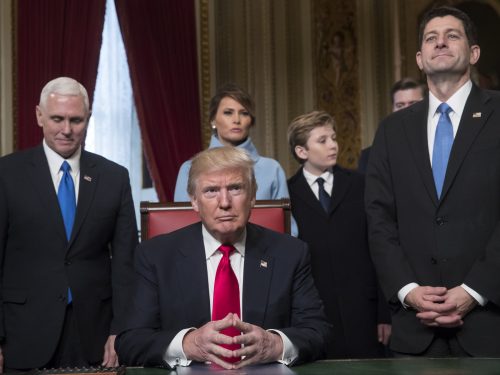The Trump Administration will come to an end this week, and not a moment too soon. Trump began his presidency with a surprise win over Hillary Clinton. He ended it with a foolish invasion of the U.S. Capitol. The win was more about the weakness of the Democratic Party than any electoral strength of Trumpism. As soon as the Democrats discarded Clinton, they had little trouble beating him.
But let’s take stock of what we might learn from the 4 years of the Trump Administration.
The Trump Administration: Three Lessons
In short, I think the Trump Administration – its improbable win, and then its predicable loss – can teach us a lot about U.S. politics.
1. Ideology is less important in U.S. elections than most people think.
Democrats spent much of last winter debating whether candidates like Bernie Sanders or Elizabeth Warren are electable. Progressives often claim that the Democratic Party must turn left in order to win back popular support. Meanwhile, centrists keep moving to the right in a never-ending search for ‘moderates’ and ‘suburban voters.’
They’re both wrong. As far as I can tell, most voters listen to broader narratives, messages, and movements, not intricate policy details. Good politics is about deeper organizing, not where one falls on a (often largely imagined) political spectrum.
2. Grievance politics and trolling have largely replaced legislative and policy accomplishments.
People writing about Trump Administration policy have a rough go of it. He made very little in the way of policy. In terms of legislation, Congress pushed through a tax bill and a criminal justice bill. Trump often ignored these efforts. They were the work of Paul Ryan and Tim Scott, respectively, much more so than the Trump Administration itself.
Beyond that, Trump signed lots of executive orders – many of which the courts overturned and/or his own officials ignored. He appointed judges, of course. But this, too, was more the work of right-wing legal groups than Trump himself.
And so, Trump did very little in office. Often he played the role of president on TV and Twitter. This kind of ‘reality TV presidency’ will surely infect future campaigns and how candidates build support.
3. Nationalist white-identitarianism will be a force in U.S. politics for years to come.
I hemmed and hawed for some months over exactly what to call Trumpism and the Trump Administration. Many people want to label them ‘fascist.’ While I don’t have a problem with that labeling, exactly, I don’t think it quite fits, either.
Variously, I’ve settled on ‘populist white-identitarianism‘ or ‘nationalist white-identitarianism.’ Those are ugly words that get at a deeper truth: Trump practices a version of authoritarianism different from what we typically think of as fascism. Trump’s version sets aside most policy goals or aims. Instead, he practices a kind of grievance politics that borders on nihilism.
And we’re going to see more of it in the future.
